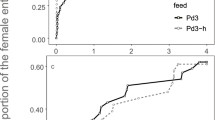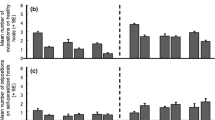Summary
Dynamic optimal diet models predict that host selection decisions and patch time allocation are influenced by the resource value of the habitat. We tested these predictions using the solitary' parasitoid Leptopilina heterotoma. Assuming that travel times between patches, the quality of previously visited patches and parasitoid density affect the parasitoids' estimation of the resource value of the habitat, different treatments were given before introducing parasitoids singly to a patch containing 5 unparasitized and 15 parasitized hosts. The decision to superparasitize is only slightly influenced by the rate of patch encounter. The quality of the previously visited patch has a strong influence. When a poor patch has been visited on the previous day, more superparasitism is observed in the partly depleted patch than when a rich patch has been searched. More superparasitism is also observed when the parasitoids are kept with conspecifics before the experiment than when they are kept alone. Increasing patch residence times are observed as the quality of the previously presented patch decreases. Host selection decisions and patch time allocation are thus clearly influenced by the pre-patch experience of the parasitoid, as predicted by dynamic optimal diet models. This can also explain why females that have never oviposited in unparasitized hosts will superparasitize readily.
Similar content being viewed by others
References
Alphen JJM van, Visser ME (1990) Superparasitism as an adaptive strategy for insect parasitoids. Annu Rev Entomol 35:59–79
Alphen JJM van, Dijken MJ van, Waage JK (1987) A functional approach to superparasitism: host discrimination needs not to be learnt. Neth J Zool 37:167–179
Bakker K, Eijsackers HJP, Lenteren JC van, Meelis E (1972) Some models describing the distribution of eggs of the parasite Pseudeucoila bochei (Hym., Cynipidae) over its hosts, larvae of Drosophila melanogaster. Oecologia 10:29–57
Barrett BA, Brunner JF (1990) Types of parasitoid-induced mortality, host stage preferences, and sex ratios exhibited by Pnigalio flavipes (Hymenoptera: Eulophidae) using Phyllonorycter elmaella (Lepidoptera: Gracillariidae) as a host. Environ Entomol 19:803–807
Batenburg FHD van, Lenteren JC van, Alphen JJM van, Bakker K (1983) Searching for and parasitization of Drosophila melanogaster (Dipt., Drosophiladae) by Leptopilina heterotoma (Hym., Eucoilidae): a Monte Carlo simulation and the real situation. Neth J Zool 33:306–336
Charnov ER (1976) Optimal foraging, the marginal value theorem. Theor Popul Biol 9:129–136
Driessen G, Hemerik L (1992) The time and egg budget of Leptopi-lina clavipes, a parasitoid of larval Drosophila. Ecol Entomol 17:17–27
Free CA, Beddington JR, Lawton JH (1977) On the inadequacy of simple models of mutual interference for parasitism and predation. J Anim Ecol 46:543–554
Janssen A, Driessen G, Haan M de, Roodbol N (1988) The impact of parasitoids on natural populations of temperate woodland Drosophila. Neth J Zool 38:61–73
Jenni W (1951) Beitrag zur Morphologic und Biologic der Cynipide Pseudocoila bochei Weld, eines Larvenparasiten von Drosophila melanogaster Meig. Acta Zool 32:177–254
Klomp H, Teerink BJ, Ma WC (1980) Discrimination between parasitized and unparasitized hosts in the egg parasite Trichogramma embryophagum (Hym.: Trichogrammatidae): a matter of learning and forgetting. Neth J Zool 30:254–277
Lenteren JC van (1976) The development of host discrimination and the prevention of superparasitism in the parasite Pseudocoila bochei (Hym.: Cynipidae). Neth J Zool 26:1–83
Lenteren JC van, Bakker K (1975) Discrimination between parasitised and unparasitized hosts in the parasitic wasp Pseudocoila bochei: a matter of learning. Nature 254:417–419
Mangel M (1989) An evolutionary interpretation of the “motivation to oviposit”. J Evol Biol 2:157–172
Mitchell WA (1990) An optimal control theory of diet selection: the effects of resource depletion and exploitative competition. Oikos 58:16–24
Roitberg BD (1990) Optimistic and pessimistic fruit flies: measuring the costs of estimation errors. Behaviour 114:65–82
Roitberg BD, Mangel M, Lalonde RG, Roitberg CA, Alphen JJM van, Vet L (1992) Seasonal dynamic shifts in patch exploitation by parasitic wasps. Behav Ecol 3:156–165
Takagi M (1987) The reproductive strategy of the gregarious parasitoid, Pteromalus puparum (Hymenoptera: Pteromalidae). 3. Superparasitism in a field population. Oecologia 71:321–324
Visser ME (1991) Prey selection by predators depleting a patch; an ESS model. Neth J Zool 41:63–79
Visser ME (1992) Adaptive self- and conspecific superparasitism in the solitary parasitoid Leptopilina heterotoma (Hymenoptera: Eucoilidae). Behav Ecol (in press)
Visser ME, Driessen G (1991) Indirect mutual interference in parasitoids. Neth J Zool 41:214–227
Visser ME, Alphen JJM van, Nell HW (1990) Adaptive super-parasitism and patch time allocation in solitary parasitoids: the influence of the number of parasitoids depleting a patch. Behaviour 114:21–36
Visser ME, Alphen JJM van, Hemerik L (1992a) Adaptive super-parasitism and patch time allocation in solitary parasitoids: an ESS model. J Anim Ecol 61:93–101
Visser ME, Luyckx B, Nell HW, Boskamp GJF (1992b) Adaptive superparasitism in solitary parasitoids: marking of parasitized hosts in relation to the pay-off from superparasitism. Ecol Entomol 17:76–82
Author information
Authors and Affiliations
Additional information
Correspondence to: M.E. Visser
Rights and permissions
About this article
Cite this article
Visser, M.E., van Alphen, J.J.M. & Nell, H.W. Adaptive superparasitism and patch time allocation in solitary parasitoids : the influence of pre-patch experience. Behav Ecol Sociobiol 31, 163–171 (1992). https://doi.org/10.1007/BF00168643
Received:
Accepted:
Issue Date:
DOI: https://doi.org/10.1007/BF00168643




